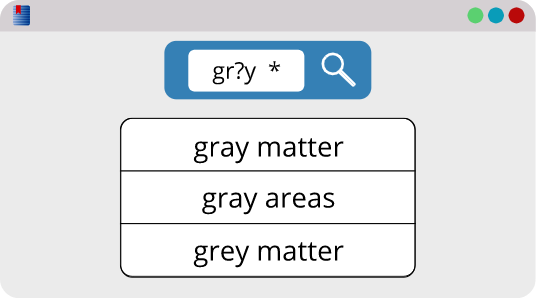Wildcards: * and ?

* and ?
Wildcards are powerful search tools. When you use wildcards like * or ?, they will stand in place of other characters.
| Wildcard | Function |
| * | 0 or more characters |
| ? | 1 characters |
A * will produce the widest search results, while a ? will only stand in place of one character. For example, if you searched for colo*r versus colo?r, you'd see these results:
| Search | Results |
| colo*r | color, colour |
| colo?r | colour |
If you wanted to see results for both color and for colour, you would want to use a * and not a ?. Although the ? might be pretty useless in this scenario, but it could come in handy for a search like the one below, where you might want to limit your results to only find gray and grey:
| Search | Results |
| gr*y | gravity, gray, gradually, grocery, greatly, grey, greedy |
| gr?y | gray, grey |
Tips
Every search is different, so mastering these two wildcards (and other special characters) will allow you to find the exact results you are looking for. Here's a couple of helpful tips:
-
*stands in place of zero or more characters, including entire words. - Wildcards can be used in any part of a word.
- Multiple wildcards may be useful (e.g.,
li??orr?sum?). - Wildcards can be combined with other special characters, such as exact and partial match searches.
Examples
| Search | Results |
| r?sum? | resume, résumé |
| house* | house, household, housekeeping |
| *ment | parchment, comment, garment |
| s*p | ship, sharp, sleep, stop |
| "you * me" | you and me, you think I'm, you get me |